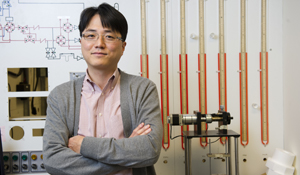Northeastern researchers’ discovery could aid in detecting nuclear threats
A team led by Northeastern researchers Swastik Kar and Yung Joon Jung has developed a way to detect nuclear materials that far outpaces any existing method. “Our detector could dramatically change the manner and accuracy with which we are able to detect nuclear threats at home or abroad,” says Kar.

